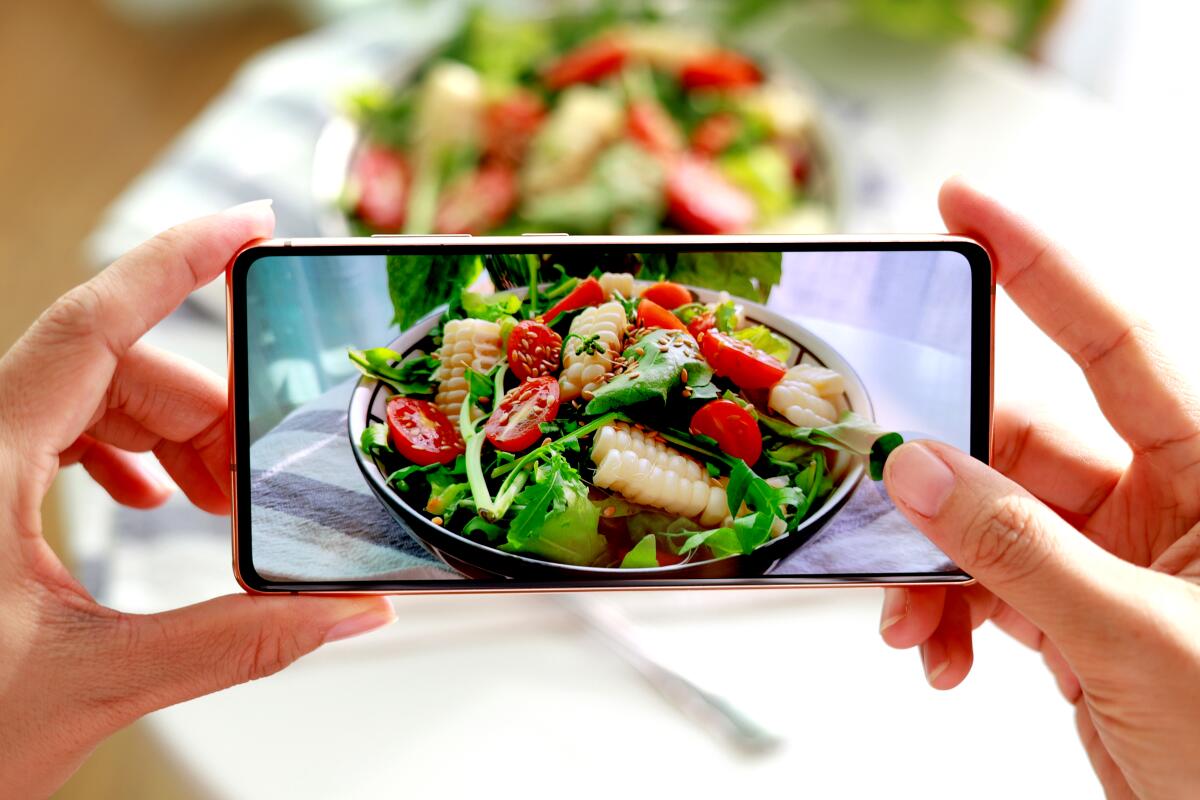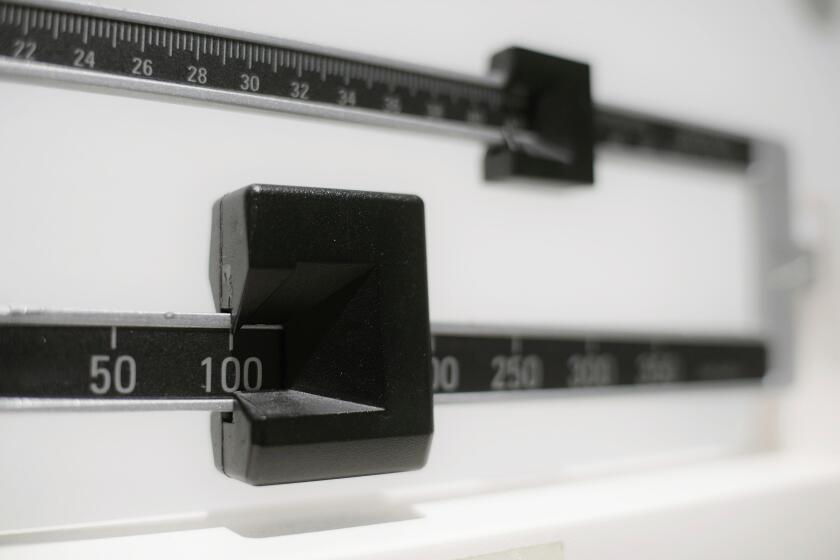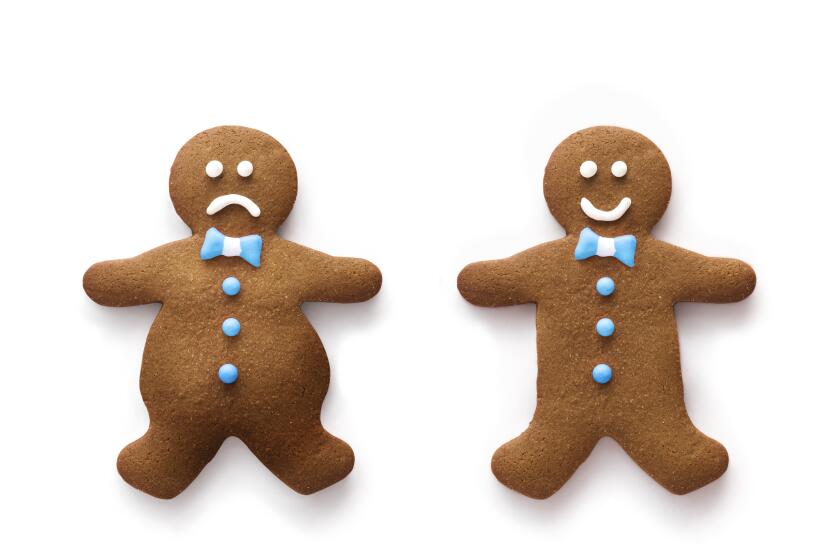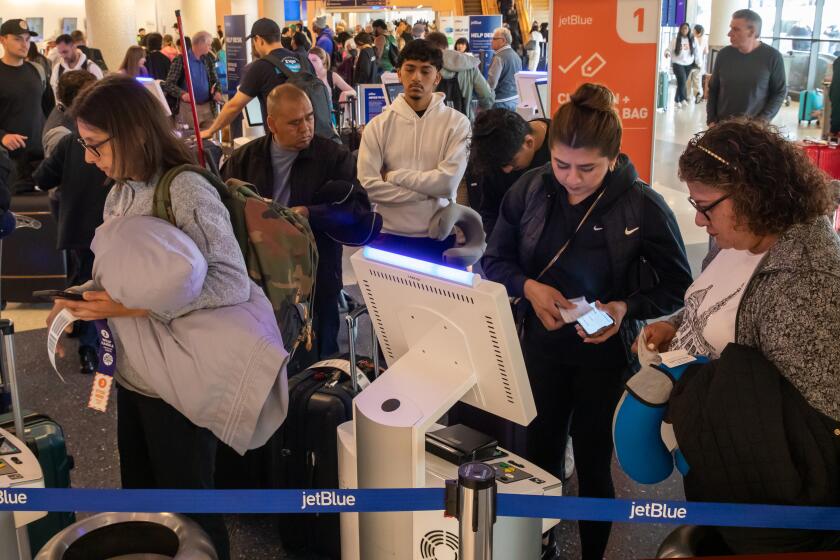Feeling the influence of social media diet claims? Instead, find what works for you

- Share via
Remember the werewolf diet? It made the rounds about 10 years ago and told adherants to fast according to lunar cycles, claiming to help you lose two to six pounds in the span of a day. Or how about the five-bite diet? This one says to skip breakfast and take only five bites of lunch and dinner.
You may be used to seeing these kinds of claims, usually pitched by beautiful, shredded individuals on the internet. You may even be tempted to believe them.
Don’t, says Colleen Christensen, a registered dietitian based in Michigan who goes by @no.food.rules on Instagram. “I don’t recommend following any sort of specific diet plans or having really any food rules or saying you should do something or you shouldn’t do something,” she said. “I embrace living in the gray.”
She’s one of a group of nutrition experts on social media who are fighting diets they consider harmful — by encouraging healthy lifestyles, rather than playing off people’s insecurities. Christensen and Erin Holt, who has a bachelor’s degree in nutrition and dietetics and hosts the Funk’tional Nutrition Podcast from New Hampshire, can help you sort facts from fads.
A study that pitted time-restricted eating against a caloric restriction diet found they were equally effective at helping obese people lose weight.
What are an influencer’s credentials?
This is a key question to ask yourself about dieting claims you see online.
“Who are you taking your information from? Because aesthetics are not a credential. How your body looks is not a credential,” Holt said.
Check if the person providing you information has any kind of professional certification. An ideal source would be a registered dietician. If their job title isn’t clear, see if they have a degree in nutrition, a precision nutrition certification, an online coaching certificate or any other official documentation.
Just because you want to look like someone doesn’t mean that they are qualified to help you achieve what they have achieved. It’s flawed logic, Christensen said: “I brush my teeth every day, but I would never call myself a dentist.”
Holt encourages you to look into the experience and education this person has. “Does this person have experience working with hundreds or even thousands of human bodies? Are their claims substantiated by the results they’ve gotten from a lot of different bodies and not just their own?”
Also ask: Is a given diet plan effective for a wide range of people?
Holt said people will react differently to different approaches.
“For example, intermittent fasting can be detrimental, catastrophic for somebody’s health, and also it can be extremely therapeutic for somebody else’s health,” she said.
“It’s like who has the biggest voice in the room? Who has the boldest claims? And who has the biggest audience? And that’s who were taking our advice from? That’s really like clickbait,” Holt added. “That’s not actual, sound nutrition advice.”
About one-sixth of Americans said they were on some kind of special diet in 2019, mostly for weight loss, or for other health reasons.
Does this diet make sense?
Beware the quick fix.
“There will always be someone promoting the easy answer and the quick fix. That is a red flag,” Holt said. “There should be some level of suspicion around this. Health, food, nutrition, even weight loss is so contextual. ... If it seems too easy, too fast, it probably is.”
Another thing to pay attention to is the timeline of weight loss.
Christensen noted that some studies she has seen may not give the full picture. If a person loses weight and keeps it off for a year or two years, that may not indicate successful weight loss, she said. “The evidence that we have for weight regain is typically a longer period” — two to five years, she said.
Is this diet advice practical?
When you see someone telling you what to eat, do a gut check. Ask yourself: Is this feasible for me, and do I want to do this?
You may face barriers of access to fresh produce and other healthy foods, for example.
Sometimes people go on diets and the restrictions have an effect on their emotional state. People forget that food can bring just as much joy as it can anxiety.
Holt added: “The vast majority of women that are coming to me are actually undereating, not overeating. So that’s a huge misconception. What happens when we dramatically undereat our calories or undereat according to our maintenance needs, we can end up with thyroid dysfunction, hormone imbalance, immune system dysregulation.”
You’ve read the stories about miracle weight loss drugs? The real miracle would be to stop blaming fat people for being fat.
What’s the right mind-set for diet and exercise?
Stop looking at your physical features as inadequacies or flaws, Holt and Christensen said. Evaluate your motivations. Are you trying to create a fuller life for yourself or are you doing it out of spite for your body? Your body does so much for you, they reminded, so take time to appreciate it and recognize that it is not the enemy.
Assess your feelings when it comes to food. “Do I want the food or the idea of the food?” Christensen suggests asking yourself.
You may be at a birthday party staring down a slice of cake. Ask: Is my body hungry? Do I want the cake because it will sustain me or because I associate cake with happiness and fulfillment?
Holt wants people to have a broader perspective on food.
“When we view food and eating only through the lens of ‘Will this make me skinny?’ that’s where we can get into trouble,” she said. “When we put limits on a pedestal above all else, we can end up sacrificing our health.”
Say you are sitting at a restaurant. You have been eating your meal and enjoying yourself. You are completely stuffed but there is still food left on your plate, and it wouldn’t make for good leftovers. You’re faced with a decision between what Christensen calls “two discomforts.” You are either sad that you didn’t finish the food you paid for or you finish it and are left with stomach pains for the rest of the night. Which feeling is more fleeting?
Christensen also urged people to remember that everyone’s body is different, and the way we look is not fully controllable. “Genetics plays a huge role in it,” she said. “Also our environments” and what we have access to.
Test positivity has ticked up in L.A. County in recent weeks, though we’re still well below peak COVID levels. If you get COVID now, here’s how to treat it, how long to isolate, how to get Paxlovid, and more information on getting healthy.
‘What I Eat in a Day’ videos and meal planning
A “What I Eat in a Day” video is just what it sounds like: a video cataloging everything a person eats in one day.
Holt wants you to examine why the video was made. Was it intended to give you inspiration for healthy meals? Or is it implying that if you follow this strict routine, you will end up like the person who made it?
Christensen makes these videos — but not because she wants you to compare your body and meal plans against hers. “One thing I do is I will keep serving sizes ambiguous and not show every single thing, because that’s honestly not what it’s about. It’s more of me explaining why did I make this food choice or giving some different ideas for someone,” she said.
She even does versions of these videos with suggestions about how to talk to yourself about food throughout the day.
Holt argues that women, in particular, can be disconnected from their bodies. “You continuously outsource your power by permission-seeking, by asking people, ‘What should I eat? What can I eat? What should I do?’”
Influencers or brands try to take advantage of this by selling you meal plans.
“Even 10 years ago when everybody wanted a meal plan, I was like, ‘No, I don’t talk about that. I don’t know how much you need to eat because it’s based on your body, it’s based on how much sleep you got, how much you exercised that day, what is your stress level?’” Holt said. “My philosophy has always been about leading people back to themselves. ... Do you always want to rely on someone else for your meals and how you eat?”
The podcast host said that we live in a society that tells us to cover up the messages from our bodies. “You have a headache, you take an Advil. ... You’re not asking, ‘Gosh, why do I have this headache to begin with?’ You are taught to divorce yourself from the messages that are coming from your body, to quiet them down.”
Holt recommends listening to your internal hunger cues. With work, you can use them to figure out what nutrition your body needs and be confident enough to make decisions for yourself, she said.
When to seek help from a professional
If you feel anxiety about food, it can’t hurt to make an appointment with a registered dietitian.
“If you need help figuring out what information applies to you, in your unique context, that would be a great time to work with a nutritionist,” Holt said. “The other part is if you are struggling with integration, like, ‘OK, I know what I’m supposed to be doing. I’m just not doing it. I need help integrating this information.’”
The easiest way to find a dietitian is to have your primary care doctor refer you to one. According to the Mayo Clinic, the types of certifications a dietitian can get are pediatrics, renal nutrition, sports dietetics, nutrition support, oncology, gerontology, and diabetes education. Many insurance companies provide coverage for services from a registered dietitian, but there may be restrictions. Check with your insurance provider.
In an appointment, the dietitian will assess your needs, counsel you on your options and what may or may not work for you, and create a nutritional plan. Then they’ll stay up to date with your progress to adjust if necessary.
“Any good coach or nutritionist or healthcare provider or practitioner should ultimately teach you how to feed yourself or how to be with yourself, find your own answers, versus being perpetually dependent on external authority figures,” Holt said. “No one knows more about your body than you.”
Christensen said there’s no right or wrong time to make an appointment, but some things are more worrying than others. “Honestly, everyone could benefit from chatting with a dietitian in some capacity. I think it’s really important to seek help if you are feeling any sort of stress or anxiety around food. ... When it gets to the point where it’s causing you stress and anxiety, that’s actually probably going to be worse for your health and well-being overall.”
If you can’t afford to see a professional, social media can help you find a supportive community.
How to get help
Call (888) 375-7767 if you or someone you know needs help with an eating disorder. Check the National Assn. of Anorexia Nervosa and Associated Disorders or the National Eating Disorders Assn. for more resources.
“With disordered eating or eating disorders, there’s so much secrecy to them and I think with that it can build up,” said Christensen. “So many people don’t know what’s normal anymore, and being able to have conversations about that, that is a very strong thing to do.”
Ultimately, both nutritionists recommended living in what they call “the gray area.”
Holt describes it as somewhere between extreme opposition to dieting and eating without any thought whatsoever. “I do rage against diet culture a bit, but I think that in the anti-diet-culture world, the pendulum has swung so hard that it has disallowed any space for us to approach healthful eating. There are some people [who] think any attempt to clean up your diet or change the way you eat is automatically labeled as diet culture. There has to be space for the gray area.”
Christensen said, “That gray area is going to look different for every single person. So I think that getting there is going to take some unlearning of all of those things because diet culture is so ingrained in us.”
About The Times Utility Journalism Team
This article is from The Times’ Utility Journalism Team. Our mission is to be essential to the lives of Southern Californians by publishing information that solves problems, answers questions and helps with decision making. We serve audiences in and around Los Angeles — including current Times subscribers and diverse communities that haven’t historically had their needs met by our coverage.
How can we be useful to you and your community? Email utility (at) latimes.com or one of our journalists: Jon Healey, Ada Tseng, Jessica Roy and Karen Garcia.
More to Read
Sign up for The Wild
We’ll help you find the best places to hike, bike and run, as well as the perfect silent spots for meditation and yoga.
You may occasionally receive promotional content from the Los Angeles Times.














